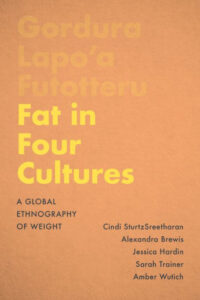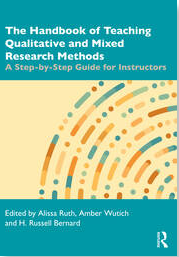Books
Fat in Four Cultures
"Fat in Four Cultures is a co-authored comparative ethnography that reveals the shared struggles and local distinctions of how people across the globe are coping with a bombardment of anti-fat messages. Highlighting important differences in how people experience "being fat," the cases in this book are based on fieldwork by five anthropologists working together, simultaneously, in four different sites across the globe: Japan, the United States, Paraguay, and Samoa.
Through these cases, Fat in Four Cultures considers what insights can be gained through systematic, cross-cultural comparison. Written in a highly eye-opening, narrative-driven style, with key terms clearly defined and consistently used, this book effectively explores a series of fundamental questions about the present and future of fat and obesity."
The Handbook of Teaching Qualitative and Mixed Research methods: A Step-by-Step Guide for Instructors
he Handbook of Teaching Qualitative and Mixed Research Methods: A Step-by-Step Guide for Instructors presents diverse pedagogical approaches to teaching 71 qualitative and mixed methods.
These tried-and-true methods are widely applicable to those teaching and those being trained in qualitative and mixed-methods research. The methods for data collection cover ethics, sampling, interviewing, recording observations of behavior, Indigenous and decolonizing methods and methodologies as well as visual and participatory methods. Methods for analyzing data include coding and finding themes, exploratory and inductive analysis, linguistic analysis, mixed-methods analysis, and comparative analysis. Each method has its own 1,500-word lesson (i.e., chapter) written by expert methodologists from around the globe. In these lessons, contributors give the reader a brief history of the method and describe how they teach it by including their best practices—with succinct, step-by-step instructions—focusing on student-centered experiential and active learning exercises.
This comprehensive, one-of a-kind text is an essential reference for instructors who teach qualitative and/or mixed methods across the Social and Behavioral Sciences and other related disciplines, including Anthropology, Sociology, Education, and Health/Nursing research.
Extreme Weight Loss: Life Before and After Bariatric Surgery
"Bariatric surgery rates around the world have increased exponentially over the past decade. In Extreme Weight Loss, anthropologists Sarah Trainer, Alexandra Brewis, and Amber Wutich provide us with an inside look at how patients experience this medical procedure, as well as its far-reaching and complex personal implications.
Drawing on patient interviews, survey data, and more, Trainer, Brewis, and Wutich explore why people decide to undergo bariatric surgery, and how that decision transforms their lives. They show, in painstaking detail, how the journey to weight loss is can be at once painful and liberating, dispiriting and self-affirming.
Extreme Weight Loss explores questions about which bodies are treated as though they belong in modern societies, and which bodies are treated as unwanted. It considers how people challenge and manage these unfair standards, illuminating what it means to be large-bodied in America’s diet-obsessed culture."
Lazy, Crazy & Disgusting: Stigma and the Undoing of Global Health
Shortlisted for the Foundation for the Sociology of Health and Illness Book Prize
Stigma is a dehumanizing process, a method of shaming and blaming that is embedded in our beliefs about who does and does not have value within society. In Lazy, Crazy, and Disgusting, medical anthropologists Alexandra Brewis and Amber Wutich explore another side of the issue: the startling fact that well-intentioned public health campaigns can create new and sometimes damaging stigma, even when they are successful.
Brewis and Wutich present a novel, synthetic argument about how stigmas act as a massive driver of global disease and suffering, killing or sickening billions every year. They focus on three of the most complex, difficult-to-fix global health efforts: bringing sanitation to all, treating mental illness, and preventing obesity. They explain how and why humans so readily stigmatize, how this derails ongoing public health efforts, and why this process invariably hurts people who are already at risk. They also explore how new stigmas enter global health so easily and consider why destigmatization is so very difficult. Finally, the book offers potential solutions that may be able to prevent, challenge, and fix stigma. Stigma elimination, Brewis and Wutich conclude, must be recognized as a necessary and core component of all global health efforts.
Drawing on the authors' keen observations and decades of fieldwork, Lazy, Crazy, and Disgusting combines a wide array of ethnographic evidence from around the globe to demonstrate conclusively how stigma undermines global health's basic goals to create both health and justice.
Analyzing Qualitative Data: Systematic Approaches
The fully updated Second Edition presents systematic methods for analyzing qualitative data with clear and easy-to-understand steps. The first half is an overview of the basics, from choosing a topic to collecting data, and coding to finding themes, while the second half covers different methods of analysis, including grounded theory, content analysis, analytic induction, semantic network analysis, ethnographic decision modeling, and more. Real examples drawn from social science and health literature along with carefully crafted, hands-on exercises at the end of each chapter allow readers to master key techniques and apply them to their own disciplines.




